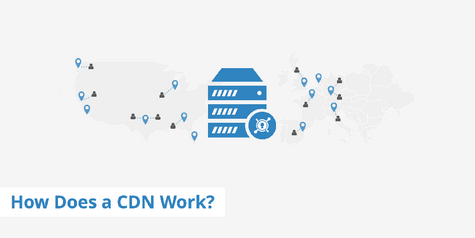How Does CDN Work: What It is, What It’s Not

Content delivery networks (CDNs) are actually part of everyday life, you just don’t know it. Every movie you stream on Netflix, every condo unit you view on AirBNB, even your daily interactions on Facebook are powered through CDNs. How does CDN workability function? And why do many companies avail of CDN providers and spend money on CDN hosting? Let’s discuss these thoughts briefly:
How does CDN Work: A Brief History
From a mere idea to the prevalence of CDN hosting, the first CDN providers came from a thought that was soon realized to work for many. If the Internet did not expand to how we see it now, CDN providers won’t be present. But just how did CDN hosting get its start?
WWW is Growing
With the growing popularity of the World Wide Web comes growth in demand. Netizens are beginning to balloon in number, and are beginning to enter the online realm in droves. But even if the Internet is only a virtual world, it can also get crowded. And websites were the first to experience this massive population.
Looming Problem
What if websites received too many visitors at once? For example, in the case of international news, since information does not reach the rest of the world yet as fast as it does nowadays, netizens will flock to the existing news sites that time, to get info right away. Can websites handle the increase in traffic? Will the website shut down?
The Idea of a CDN
There’s got to be a way to redirect or manage information so that it won’t have to always be from the same source, or there could be some sort of gateway that will get information from the website’s source and meet website visitors halfway. This could speed the process of catering to many online website users. And with this, the CDN was born.
The Early CDN Providers
It was ISP providers who first staged this capability to get info from home website servers, then store them for future visitors. From then on, CDN providers that center on CDN hosting started to cater their services to the general public.
CDN Evolution
CDN providers started out for ease of delivery of plain online data, such as videos, audio files, and text information. Nowadays, CDN hosting also includes cloud storage and cloud computing capabilities. CDN providers can also help you with SaaS, security management, and other cloud-based functions.
What It’s Not
While it’s fairly easy to understand what CDN hosting is all about, let’s talk first about what it’s not. CDN providers are ultimately different from these services:
Not Web Hosting
CDN hosting is not web hosting. In the latter, one has to carry out all the information needed to stage a website: visuals, texts, URLs, everything. CDN providers will not create a new website for you. CDN hosting, however, will make use of existing website files found in your current home server.
Not Cloud Storage
CDN providers are not here to provide you with cloud storage space either. Though yes, CDN hosting involves some sort of storage, but this is not necessarily storage of files.
Not an Online Booster
No, CDN providers are not here to speed up your internet speed, or hike up the browsing capabilities of people trying to visit your website. But one thing it for sure, CDN hosting will help you speed up the web experience, for you and your website visitors.
What It Is
A CDN, also called an “edge server”, is a remotely-placed data hub that will gather data from your home website and store them in networks closer to your potential website visitors. This is how CDNs do it:
Strategic Caching
Caching is the process of managing data so that it is duplicated, stored, then released when the time a website visitor comes. CDN hosting is about strategic caching, in that when a website visitor arrives, they do not have to go straight to the website. Instead, they’ll be routed to a nearby CDN activated by the CDN provider, and enjoy the same experience as if they are visiting the home website.
Quick Browsing
Let’s say an online user wants to visit your website. Your website is hosted in a faraway location, but there is a nearer CDN hosting server. The CDN provider will activate that CDN hosting server by linking your home server to the remote CDN hosting server. This particular CDN will then pull data from the home website, while the online user is directed to the CDN hosting server. This user enjoys the same contents of the website, but at a faster speed, because it is brought to them at a closer location.
Farther and Faster
CDN providers have staged various CDN hosting networks across the globe. This means CDN hosting is possible almost everywhere on Earth, and CDN providers will simply help you in identifying which CDN hosting hubs will be used by your company. This way, CDN providers are actually helping you reach farther netizens.
There you Have It!
What does CDN workability look like? It’s actually a lot simpler than you think. CDN providers can explain the process further to you if ever you want to avail of CDN hosting services. But at least now, you have an idea of what it is, and what it’s not.